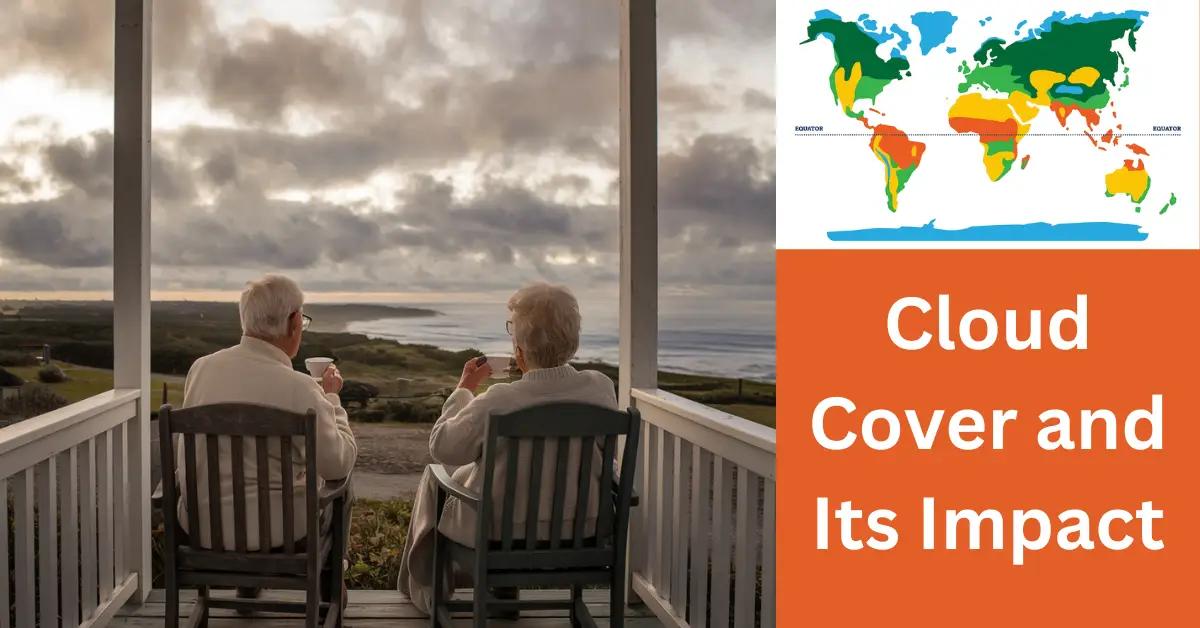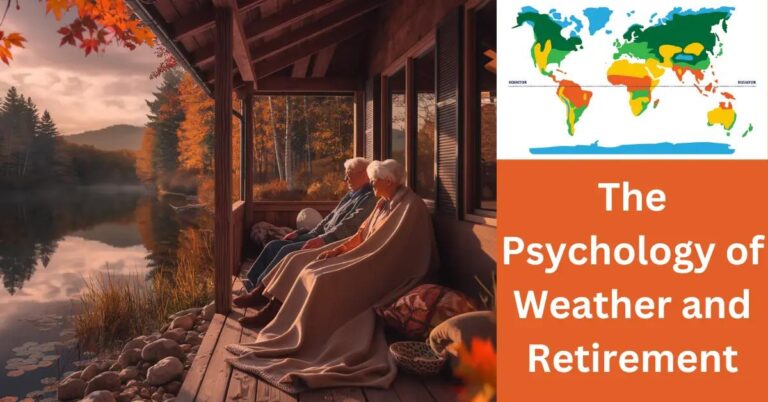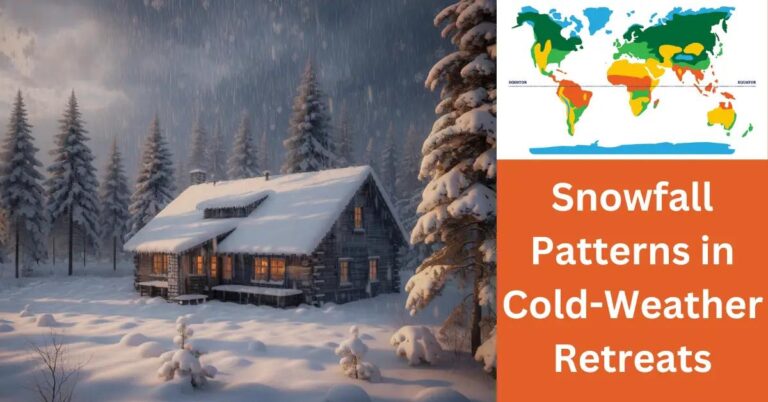TL;DR:
- Cloud cover affects seniors' temperature regulation, mood, and vitamin D production, impacting bone health and immune function.
- Less sunlight can lead to vitamin D deficiency and mood issues like sadness or inactivity in seniors.
- Clouds moderate temperatures: cooling during the day and warming at night.
- Outdoor exposure to light is crucial; vitamin D supplements and warm clothing are recommended.
- Weather adaptation in senior living includes climate-suited building designs and activity adjustments.
- Ideal retirement climates feature mild temperatures and low humidity, but climate change affects these choices.
- Cloudy weather can deter outdoor activities; indoor alternatives and layered clothing offer flexibility.
- Long-term cloud cover affects retirement planning by potentially increasing heating costs and impacting mental health.
- Sunlight is vital for maintaining health, fostering activity, and ensuring well-being in retirement.
Are you planning your retirement or already enjoying the golden years? Don't overlook the clouds—quite literally! Cloud cover affects more than weather; it impacts health, mood, and living conditions, especially for retirees. Discover how cloudy skies influence your daily life, from vitamin D levels to mental wellness, and learn how to thrive whether the sun shines or not. Your happy retirement could be one sunny insight away!
How Does Cloud Cover Influence Health in Retired Populations?
Cloud cover affects our health in many ways, especially for seniors. Understanding cloud cover patterns is crucial. These patterns occur when clouds block sunlight, impacting warmth and vitamin creation.
What effect does cloud cover have? It influences temperature and mood. When skies stay gray, it gets cooler, which means staying warm gets harder. Seniors might feel colder faster because their bodies don't handle temperature shifts well. It makes aches worse and affects overall comfort.
Clouds also affect vitamin D levels. Our bodies need sunlight to create vitamin D. This vitamin keeps bones strong and helps the immune system. Under constant clouds, seniors risk lacking vitamin D. This can lead to weak bones and feeling tired.
Why is the cloud cover important? It impacts mental health, too. Long stretches without sunlight can cause mood issues like sadness or feeling down. Sunlight helps us feel good by boosting happy chemicals in the brain. Less light makes seniors more prone to sadness and inactivity.
To manage these effects, seniors should spend time outdoors on sunnier days, or near windows when indoors. Doctors might suggest vitamin D pills to help with deficiencies. Keeping warm with cozy clothes during colder days can aid comfort.
In regions with lots of cloud cover, it's vital to find ways to get enough light and stay warm. Communities can help by having indoor activities or social events to keep moods up. Understanding cloud cover's impact means healthier, happier retirement living.
What Role Does Sunlight Exposure Play in Senior Living?
Sunlight is essential for all, especially seniors. It boosts mood and aids in well-being. Retirees value sunny days because they bring warmth and cheer. But clouds influence light, affecting body and mind.
How does cloud cover affect temperature during the day and night?
Clouds act like blankets. In the day, they block the sun, cooling us down. At night, clouds trap heat, keeping temperatures stable. For retirees, stable temperatures help maintain comfort and health.
Sunlight exposure brings many health benefits. It helps our bodies create vitamin D. Vitamin D is important for bone health and immune function. Seniors often need more vitamin D to stay strong and healthy.
Sun exposure also has benefits beyond vitamin D. It encourages physical activity, which keeps hearts healthy and minds sharp. But too much sun can be harmful. Protecting skin while outside is crucial.
Understanding UV radiation is key. UV rays can harm skin and eyes, especially in sunny areas. Using sunscreen, sunglasses, and hats are wise ways to protect oneself. Retirees should plan their time outdoors to avoid the sun at its strongest.
In searching for a place to retire, the sun's presence is a plus. Sunnier places boost mood and offer energy. Many retirees choose destinations known for sunny skies to enhance their quality of life.
For outdoor enjoyment, UV protection is important. Fun activities like walking or gardening can be safe with proper gear. Ensure clothing covers skin well, and always apply sunscreen. Choose shady spots for rest.
In sum, sunlight improves life quality for seniors. It enhances health, encourages activity, and adds joy. By understanding how clouds and sun affect us, seniors can make informed choices on retirement living.
What are the Effects of Weather on Senior Living Communities?
Clouds can make the local temperature warmer at night. They act like a blanket. This warmth is important for senior living communities. Weather plays a big role in how seniors enjoy communal areas. A sunny day allows for gardening and social events. But rain or clouds may keep people indoors. When building these communities, architects must think about weather. Buildings need strong roofs and good drainage for rainy days.
Services in retirement should change with the weather too. In hot places, air conditioning is a must. In rainy areas, maybe indoor walkways are needed. These changes help keep seniors active and social. Indoor environments also need good designs. Big windows can bring in natural light even on overcast days. This helps improve mood and energy levels.
Changing the retirement community climate also means planning for different seasons. Residents may need different clothes or routines. For example, they could walk indoors if it's icy outside. Knowing how to adapt is part of living well in these places.
Retirement communities aim to improve the quality of life for seniors. Weather is a big piece of that puzzle. Being ready for different conditions helps everyone stay healthy. Keeping inside spaces inviting means people stay comfortable no matter what it's like outside. These strategies ensure seniors stay active and connected with others.
Which Climates Are Considered Ideal for Retirees?
The best places to retire often boast a mild climate. Consistent temperatures, gentle breezes, and clear skies can enhance retirement life significantly. So, where is the best place to retire with climate change? Several criteria can guide retirees. The ideal climate offers mild winters and not too hot summers. A stable climate, with limited extreme weather, is also important.
Let's take Florida, for example. With its warm and sunny climate, it attracts many retirees. In other countries, places like the Algarve in Portugal or Costa Rica also offer favorable conditions. Warm areas with low humidity often top the list. They provide comfort and improve overall well-being, making them ideal climates for aging populations.
However, climate change is shifting these norms. Rising temperatures and unusual weather patterns affect traditional retirement spots. As a retiree, it's crucial to keep climate change in mind. Regions like the Pacific Northwest, with milder summer temperatures due to cloud cover, are gaining popularity.
Evaluating retirement locations? Pay attention to climate stability and health benefits. A place with stable weather can reduce stress and promote a healthier lifestyle. Many retirees seek out environments with clean air and mild conditions. These contribute to an active life, which is key for happy and healthy aging.
To assess local climate stability, check historical weather data. This data can offer insights into the frequency of extreme weather. Speak with residents and consider potential health effects, like humidity's impact on joint pain.
Information is key, so use resources like NOAA for reliable climate data. Explore regions affected by climate change, think about how weather changes could impact health and happiness in the years to come. By choosing carefully, retirees can find climates that enhance their quality of life even amidst a changing global environment.
How Does Cloudiness Impact Mental and Physical Well-Being in Seniors?
Cloud cover can have real effects on a senior's mental and physical health. For some seniors, cloudy weather may lead to mood changes and mental health issues like sadness or anxiety. This is because less sunlight can reduce levels of serotonin, a brain chemical that influences mood.
Cloudy weather can also influence physical activity. Many seniors might feel less motivated to exercise when the skies are gray. The lack of sunshine can make outdoor activities less appealing, causing some to become less active overall. But it is important for seniors to remain active, as exercise maintains their health.
Vitamin D is another big piece of the puzzle. Our bodies need sunlight to produce vitamin D, and cloudy weather can lead to vitamin D shortages in seniors. Vitamin D is vital for bone health and immune system function, so deficiencies can affect seniors' wellbeing.
To manage these challenges, it's important for seniors to take action. Getting outside even on cloudy days is a good idea. Short walks or doing fun exercises indoors can keep activity levels up. Eating foods rich in vitamin D, like fatty fish or fortified milk, helps balance the lack of sun exposure.
Monitoring and supporting mental health is also important. Loved ones and caregivers can help by checking in and encouraging seniors to stay involved with family and friends. Social connections can provide support and lift spirits, even on cloudy days.
Keeping an eye on cloud cover and how it affects seniors can make a big difference. With the right steps, seniors can maintain good mental and physical health, despite what the weather might bring.
How Can Seniors Adapt to Various Climate Changes in Retirement?
Clouds play a surprising role in our comfort during the night. They act like a blanket, trapping heat and keeping temperatures stable. Without this protection, nights can get chilly fast. But what does this mean for seniors?
For retirees, especially those with health issues, changing temperatures can be hard. Cloud cover affects how warm or cold a night can get. Planning for these changes is key. When nights are warm, rooms should be well-ventilated. On cold nights, thick blankets and warm clothes help keep cozy.
Changing weather can mess with daily plans. Unpredictable weather means having a flexible routine can help. If rain shows up, have indoor activities ready to go. On sunny days, take advantage of nice weather for walks or gardening.
Clothing plays a big role too. Layers help adjust to temperature changes. Raincoats, hats, and good shoes can make outings more pleasant. Choosing the right gear lets seniors stay active and comfortable in any weather.
Long-term planning for retirees should include climate adaptation. As we age, our bodies might not handle climate shifts as well. Knowing local weather patterns helps make smarter choices about where to live. Some places have gentle climates which keep temperature swings in check.
Having a community that understands these needs is crucial. In places with changing weather, facilities should offer solutions. Such as adjusting indoor temperatures and planning safe activities. Not worrying about the weather lets seniors focus on enjoying life.
Adapting to climate changes keeps seniors happy and healthy in their golden years. Being ready for clouds and chilly nights can make all the difference. It's about making the right choices and having a plan for dealing with weather-related challenges.
How Do Leisure Activities for Retirees Differ with Changing Weather Patterns?
Rain or shine, retirees love their outings. But what happens when the weather plays tricks? The big question is: How does cloud cover affect temperature during the day and night? Precision: More clouds mean cooler days and warmer nights. Clouds act like giant blankets. During the day, they block sun rays, keeping us cooler. But at night, they trap heat close to the ground, making it warmer. This natural insulation changes how seniors plan their days.
Retirees love activities like walking, gardening, and birdwatching. But cloudy skies might make seniors less motivated. Should activities stop because of clouds? No way! We can encourage seniors to stay active. Indoor activities like yoga or board games keep bodies and minds nimble. It's about twisting plans, not stopping them. Seniors might also try group fitness indoors. It's social and keeps spirits high.
But sometimes, outings are a must. Planning is key. Choose safe and accessible sites for seniors. A sunny park is wonderful, but plan for backup. Museums or indoor gardens serve as good options when raindrops fall. For outdoor events, pack umbrellas and check the weather. Make sure pathways are non-slip and easy to navigate.
Different climates need different plans. In cooler places, add layers. Keep warm and cozy. In hot spots, have water and shade ready. Hats and light clothing help too. Long sun exposure can be harmful, so balance is the goal. Seniors should always protect their skin, no matter the weather.
Weather might shift retiree plans, but it doesn't have to stop them. Retirees thrive with activities that suit both the weather and their preferences. Adapting is about exploring new ways, staying active, and having fun together. What matters most is the joy and the shared moments, whether under sunny skies or cloudy ones.
What are the implications of long-term cloud cover in retirement planning?
Cloud cover influences many aspects of retirement planning. The question everyone asks is, what is the net effect of cloud cover on Earth's global temperature today? The answer is, cloud cover moderates Earth's temperature. This means it keeps the planet cooler during the day and warmer at night, affecting energy needs.
When planning for retirement, consider weather impacts on finances and logistics. Areas with persistent cloud cover often have higher heating costs in winter. This can influence your living expenses significantly over time.
Cloud cover also affects health. Lacking sunlight can lead to vitamin D deficiency. It is crucial to think about this when choosing where to retire. Vitamin D keeps bones healthy and can lift your mood.
Taking these long-term health implications seriously is important. Cloudiness can lead to seasonal affective disorder, impacting mental health. This is something to keep in mind, especially if you enjoy sunshine.
Including climate data in retirement decisions helps in making the right choice. Using technology for weather forecasting and planning can guide you in finding the right location. Technology tools provide precise weather data for different places. This helps in understanding the long-term weather patterns of a region.
Cloud cover might affect those who plan to be active and independent seniors. Those who love outdoor hobbies might find persistent clouds limiting. Which is why understanding local weather patterns is invaluable.
In conclusion, consider not just the cost but the weather when planning retirement. Be mindful of both financial impacts and health concerns related to cloud cover. Think of how to include climate data into your plans. Technology can make a difference in finding the best place to enjoy your golden years.
How Do Overcast Skies Affect Seniors' Travel and Relocation Preferences?
When clouds linger, they can reshape how seniors choose travel spots. A big thing to consider is where the cloud cover is most dense. The Pacific Northwest and parts of Europe have a lot of cloudy days. If you like sunshine, check somewhere else first. Overcast conditions and senior travel preferences go hand in hand. Dense clouds can make a place feel cooler and less inviting. They might impact mood, too.
Weather affects mobility choices. Many seniors choose sunny places for better moods and more energy. Clear days encourage outdoor fun and social time. Some elders feel weary in gloomy climates.
Moving to a place with frequent clouds has its upsides, though. You might avoid the harsh sun and lower your skin cancer risk. It could also mean less need for air conditioning in summer. But, you might miss out on easy ways to get vitamin D.
When it comes to choosing a spot, consider the balance. Think about how clouds fit your lifestyle. Maybe you enjoy reading by a cozy fire inside. Or, perhaps you miss soaking up the sun on warm beaches.
Use online resources to find weather info. Websites like NOAA offer good data on climate. You can check average cloud cover, temperature ranges, and even sun hours.
Plan travel with tools that offer weather forecasts. Apps can help you pack the right gear. Packing for variable weather gives you flexibility on trips. Seniors may benefit from weather-conscious travel tips.
Cloud cover impacts more than just clothing choices. It affects mobility, mood, and nerves about relocating. Seniors should weigh these factors to find the best living environment. Making informed decisions can aid in happier, stress-free retirements.
Why is natural light important for aging populations in retirement settings?
Natural light plays a powerful role in healthy aging. It helps our bodies know when to sleep and when to be awake. When I think of the golden sunset or first light of dawn, I think of peace. Many of us thrive with natural light streaming in.
But what happens if we don't get enough natural light due to cloud cover? Lack of sunlight can lead to poor sleep and low moods in seniors. Our skin makes vitamin D when sunlight meets it, which keeps our bones strong. Without enough sunlight, seniors might need extra vitamin D.
One might ask, "Why is cloud cover important?" Precision: Cloud cover changes how much sunlight we get. When there are thick clouds, the sunlight we need might not reach us. This might affect how lively seniors feel or how well they sleep. I've found that the glow from the sun helps lift spirits and keep minds sharp, even as age advances.
So how can we deal with this? We can build spaces that invite sunlight. Big windows and light paint colors help make rooms brighter. This ensures that during cloud-filled days, our spaces still feel warm and lively. It's smart to encourage our seniors to step outside when the weather allows. Natural sunshine can make walks and outdoor time feel refreshing and joyful.
For times when clouds block the sky, good indoor lighting can help. Using lights that mimic natural sunlight offers a helpful boost. This can support seniors in feeling bright and alert, even when the weather isn't.
These strategies ensure that seniors thrive. Our goal should be to keep lighting warm, inviting, and friendly. Feeling connected to the rhythm of day and night can help maintain a sense of peace and order. Natural light isn't just a perk; it's a key to staying healthy and spirited through retirement.
Conclusion
Cloud cover plays a big role in senior health and wellness. It affects temperature regulation, vitamin D levels, and overall mood. Overcast days can challenge daily plans, but with some preparation, seniors can still feel great in cloudy places. By understanding the climate, using sun protection, and adapting spaces, retirees can enjoy enriching lives in various weather conditions. Embrace the sun when it shines, protect yourself when it doesn't, and always seek the joy of fresh air. Careful climate planning makes a smoother retirement experience.












